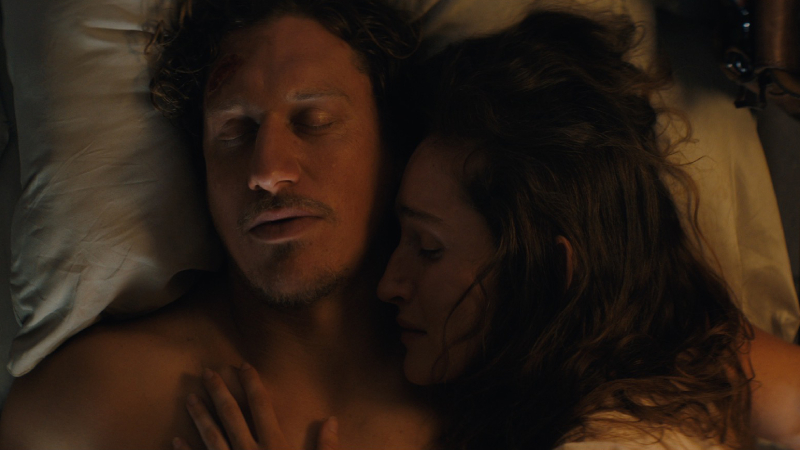




One character tells the other that they’re messed up in the head, only for it to be apparent that both are prone to prejudice and racism, defining the criticism as hypocrisy. Confederate soldier Moses Jennings (Sam Bullington) sees the abolitionist cause as a betrayal, yet he respects the “red man.” Meanwhile, Union soldier Israel Terry (Damian Conrad-Davis) has compassion for the black American but dehumanises the “red man”.
In Deborah Correa’s feature debut, The War Between, written by Ron Yungul, the desert is both beautiful and deadly, as are the human souls of the two characters. The story is built around duality, specifically the two characters we should condemn. Despite their capacity for prejudice, racism and violence, whose rhetoric is morally indefensible, there’s a reluctance to do so. Terry describes Jennings in one scene as both an enemy and a friend. This is indicative of Correa and Yungul’s desire to lose themselves in the moral grey.
Set in April 1862, the American Civil War is in its second bloody and violent year. Compatriots are killing their own, driven by hostile ideological differences. The events of the story follow the engagement of California Volunteers with Confederate forces for control of the Southwest near Tucson, at Picacho Peak on Tuesday, April 15th, 1862.
The War Between begins the following day, with the bloodstained Israel Terry lying in the heat of the unforgiving Arizona desert. When he and Moses Jennings happen on one another, a brief skirmish ensues, but with a scarcity of water and the threat of the Apache, the pair are forced to cooperate in order to survive.

The War Between effectively sets itself up with Terry, who is burdened by the guilt of an ill-advised choice that saw his friend killed in the skirmish, and Jennings, who resembles a devil-like trickster. The back-and-forth between the pair in their contentious acquaintanceship, fuelled heavily by Terry’s struggle to set aside his contempt for the Confederacy, and Jennings provoking the audience’s suspicion, offers signs of hope. Correa’s debut, however, is defined by the positive aspects rubbing up against the negative distractions. Correa and Yungul negotiate these frustrating aspects of the film’s aesthetic and narrative in order to keep the audience engaged, or at least interested in remaining on the journey.
At times, the story fails to recognise the value and necessity of silence. The film is unnecessarily loud – Conrad-Davis in particular reverts to shouting, and the overuse of music is suffocating, denying the natural tension, suspense and emotions to drive many of its scenes. The War Between also has the feel of a stage play appropriated in film form. The style of acting is more suited to the stage, which at times feels too theatrical, and at its worst, the ropey script or performances lack the subtlety required for onscreen drama. Scenes are over-played, leaving the impression that the actors are playing pretend in front of the camera.
Despite these shortcomings, Correa and Yungul navigate the journey in order to reach some emotional heights. There’s genuine potential, especially in the ideological conflict between the two men. This become particularly interesting when they cross paths with Great Seer (Wayne Charles Baker), a banished native. The themes and ideas that gradually emerge in the story feels like a fitting nod to the Western genre‘s self-awareness of human tragedy.
Correa displays a raw talent that requires honing. At present, she’s stuck with one foot on the stage, the other on the film set. She’s beleaguered by struggles needed in order to refine the script. She treats the themes heavily-handed yet does not dig down into the crucial ideological differences between the characters.
The War Between premiered at the Phoenix Film Festival.
















